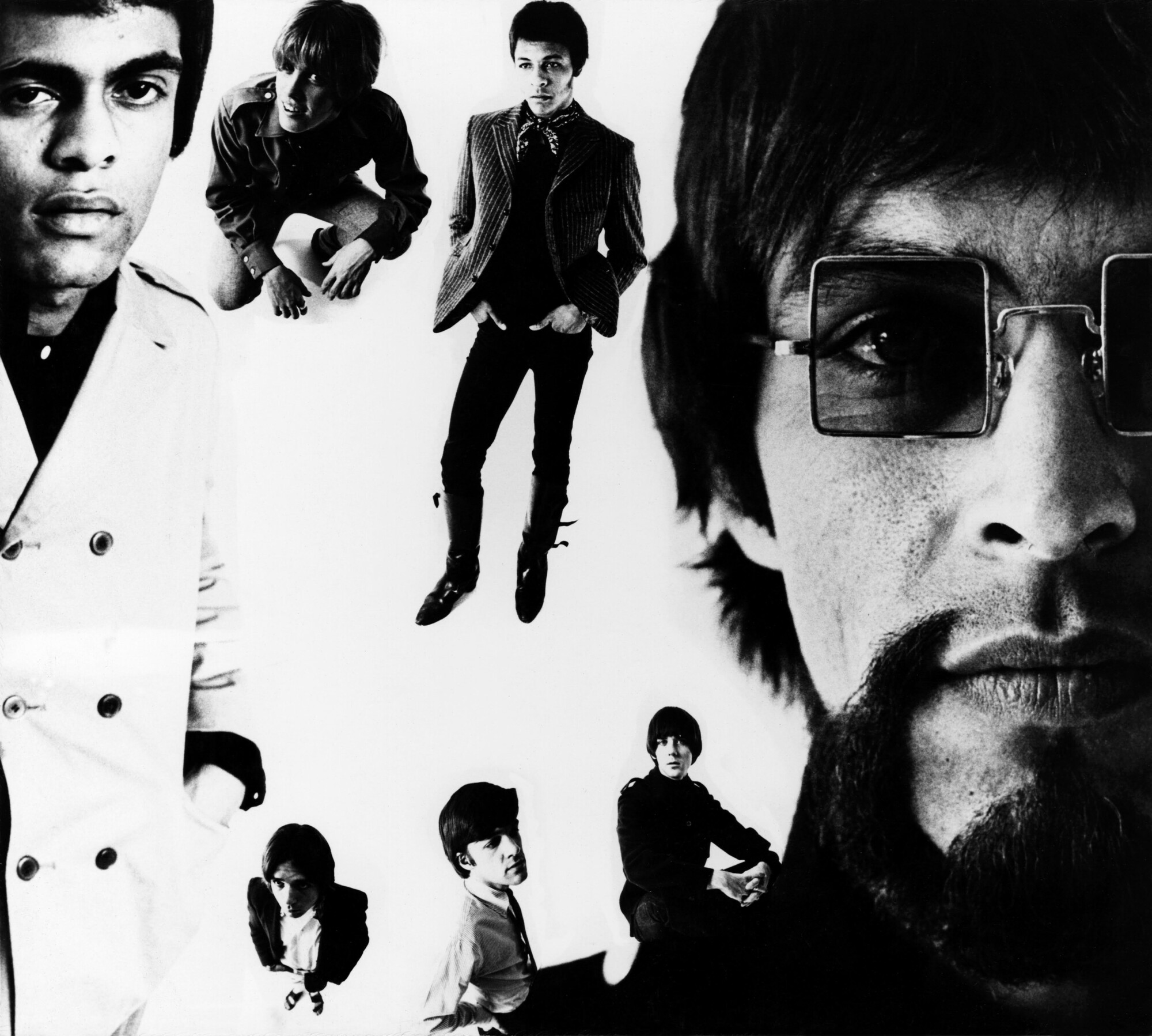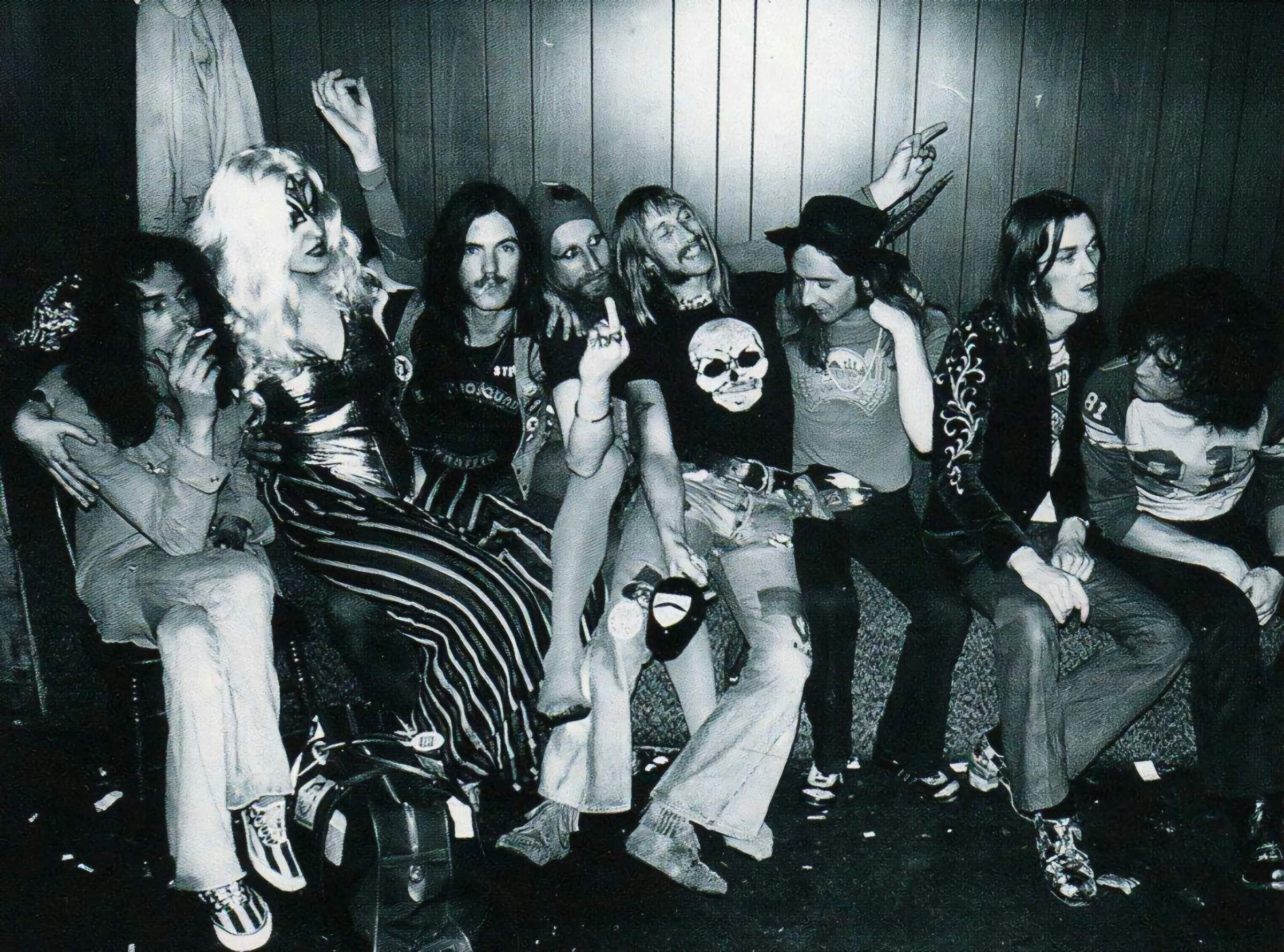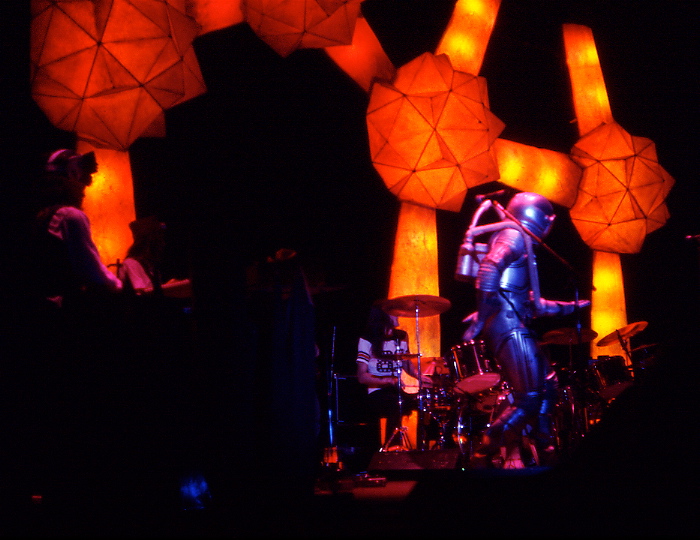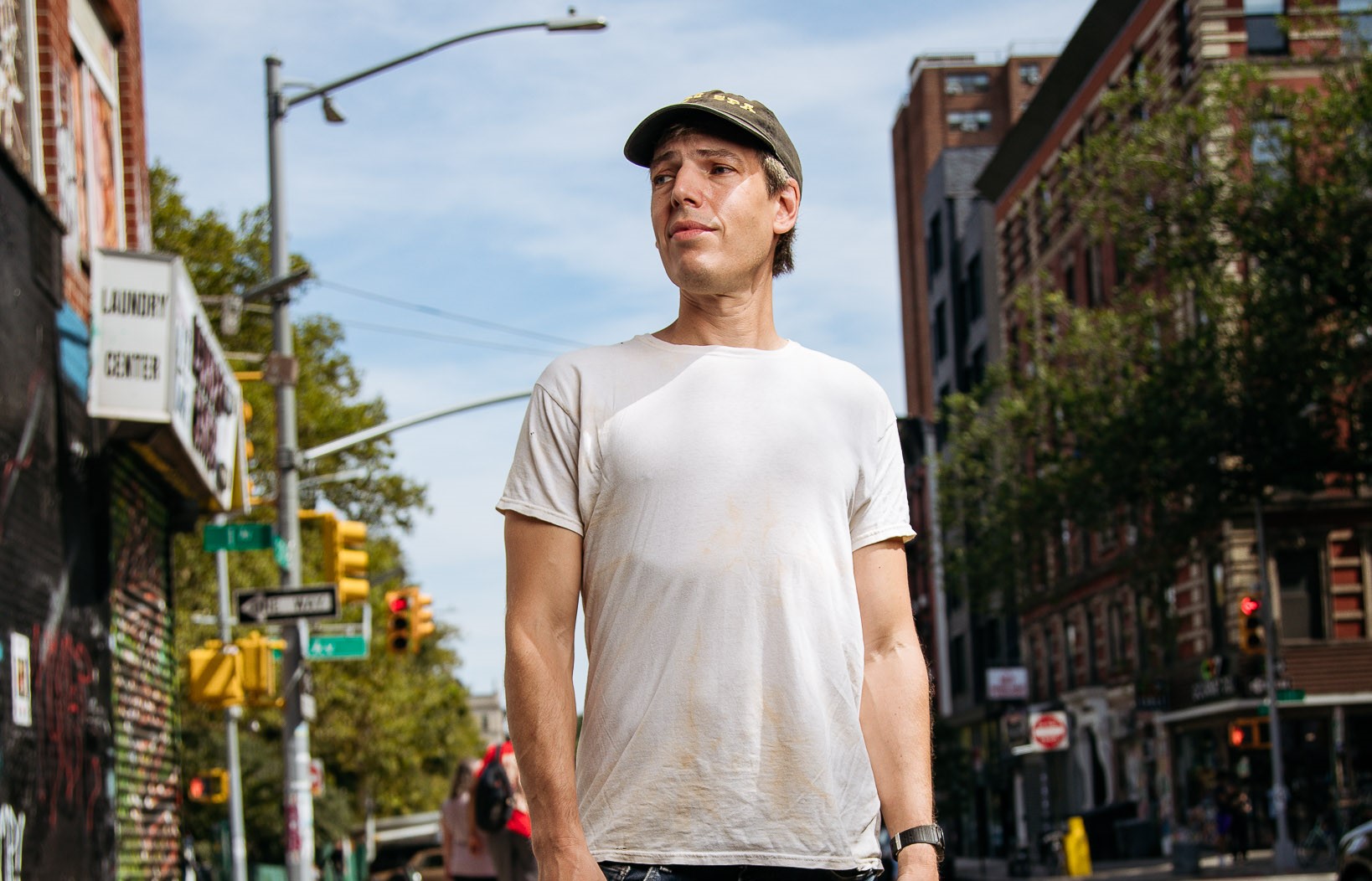Love | Interview | ‘Expressions Tell Everything’ 7″ Vinyl Box Set
The legendary Love’s original run of singles from 1966 to 1969 are collected and reissued together as a deluxe 7” vinyl Box Set including two exclusive 7”s thanks to reissue specialists New Land Records.
The label was recently granted access to the original 7” reels courtesy of Rhino / Warner and all tracks were remastered especially for these singles by Grammy nominated mastering engineer Bill Inglot. Presented inside a deluxe box with spot-on gloss finish, the 8 x 7” singles each feature unique and original picture sleeves with “Elektra-style” New Land labels. At the centre of this set is a 62-page booklet featuring track-by-track annotation by original guitarist Johnny Echols and in-depth liner notes from Grammy Award nominated writer Andrew Sandoval.
As Love’s Johnny Echols observes, “The musicians known collectively as Love were a group of five uniquely talented individuals…and though the full story of this fascinating cast of characters has yet to be told, this box set represents a small sample of the body of work produced by this group and has proven to be timeless.”
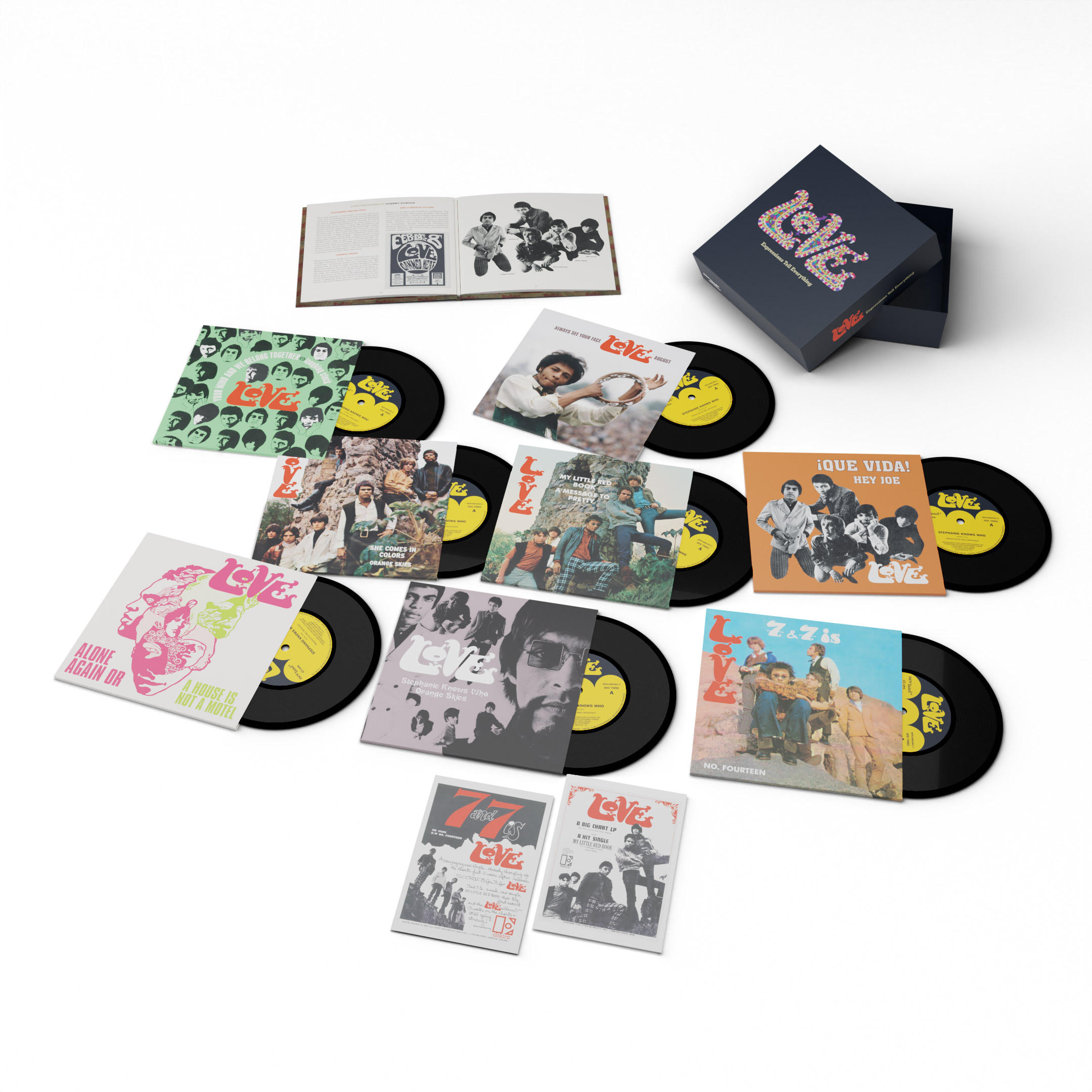
“Love songs were most definitely a group effort”
These days we often forget the importance of the “single” format, which to a certain degree was even more important in the 60s. Love released a lot of brilliant singles in the period of 1966-1969. Are you excited to have the new version again in your hands?
Johnny Echols: I’m pleased that this beautifully packaged, meticulously researched, and produced box set of Love singles has been re-released and made available to a new generation. I’m excited, and looking forward to feedback from our fans.
It didn’t take a very long time to produce a truly outstanding single with ‘7 and 7 Is,’ how do you recall recording it?
‘7 And 7 Is,’ of all the songs Love played, this was without a doubt the most challenging to record. It was initially a much slower tempo “Dylanesque” autobiographical folk song. However, by the time we finished the final take, it bore little resemblance to the song Arthur Lee wrote. Love had an endorsement deal with Vox instruments which were distributed in the US by the “Thomas Organ Co.” Kenny Forssi and I dropped by the Thomas showroom to pick up a new amp when the universe smiled on us. They had recently finished a prototype bass guitar pedal and asked Kenny to try it out. This was the first of its kind, essentially a wickedly loud bass guitar distortion pedal. At the time, distortion was a no-no on the bass. Engineers were adamant that the bass track must be clean. As I mentioned, this visit was serendipitous in that they also gave me a new vibrato pedal that was much more expressive than the built-in vibrato, or tremolo effect included on most guitar amps.
While rehearsing ‘7 And 7 Is,’ for the upcoming recording session, Kenny and I started experimenting with our new toys. At first, Arthur Lee wasn’t too thrilled with the radically different direction his song was beginning to take, but fortunately, he was also a bit chuffed with the sound of our latest gadgets and quickly came on board. The new version of the song really began to take shape when Arthur had a eureka moment. (Kenny had been the bassist in The Surfaris, the group that recorded the surf hit ‘Wipe Out’). Arthur said what if we do the drum rolls, similar to ‘Wipe Out’? We all agreed that would be cool. “But do you think Snoopy can pull it off?” I wondered out loud. We all looked at Snoopy [ Alban “Snoopy” Pfisterer, drummer], who said “hell yes, I can do it, it’s just standard snare-drum rolls.” Though playing those “standard” snare-drum rolls proved to be much harder than young Snoopy realized. It was excruciatingly difficult for him to stay in sync with the guitar’s unwavering vibrato. If he was off, by even a millisecond, the track would be unusable. Of course, it was suggested by engineer Bruce Botnick that we add the vibrato later during the mixdown. Drummers invariably speed up and slow down during a track. If everyone is playing together, they make unconscious adjustments that a pedal obviously can’t make.
After a brief explanation, we finally got him to understand that the vibrato was inexorably tied to the drums, so you can’t add it later. If the drums and guitars are not in sync from the start, the timing would still be off. They need to play together or it won’t work.” The other problem was the volume levels. Snoopy could not hear himself, and the guitars, and especially the overdriven bass, were so loud they were bleeding into all the mics and headphones. We resolved the issue by having Arthur (who had excellent timing) stand next to the drums and clap his hands with the vibrato, while Snoopy watched him and played along. After close to one hundred takes, it all came together… That afternoon/evening at Sunset Sound Studios will remain etched in my memory banks forever.
When you arrived at Sunset Sound to record the first Love album, with Jac Holzman acting as producer and Bruce Botnick as the engineer, were you surprised by how much influence Jac wanted when it came to recording?
Surprised is an understatement…exasperated, would be more descriptive. I’d been a working musician since the age of fourteen. And prior to signing with Elektra, Arthur and I had been with several different record labels. And Jac Holzman was the first record company president to insinuate himself into song choices and the inner workings of our group, i.e. how we played our songs. The experience was truly exasperating. He behaved more like an A&R man than the president of a record company. I was beginning to question why he was so gung-ho to sign us if he wasn’t happy with our sound. By the way, due to all the negative feedback he received from the group, with the exception of ‘7 And 7 Is,’ Jac did not attend subsequent recording sessions.
Do you feel that there’s a lack of “live” energy on the debut album because of his influences?
I do indeed…we were at loggerheads from the beginning of the recording sessions. The group had played these songs to huge crowds, three sets each night, seven days a week for well over a year. We were acutely aware of what our audience wanted to hear. Jac continually interfered by trying to get us to turn down, or change our amp settings, i.e. softening the loud “in-your-face, rock & roll sound” we normally projected… “When we first signed with Elektra, they were mainly a “folk” label, so they were accustomed to recording a very different kind of music. In fact, Jac prided himself on the pristine, High fidelity, Audiophile quality of Elektra/Nonesuch releases. However, the first Love album would be better characterized as lo-fi. At the time, we were a loud, raucous, minimalist group, more akin to a garage band. Which was very different from the kind of music the label was accustomed to releasing. After listening to the finished product, we were royally pissed. The group gave serious consideration to finding a new label. Our relationship with Elektra was off to an inauspicious beginning.
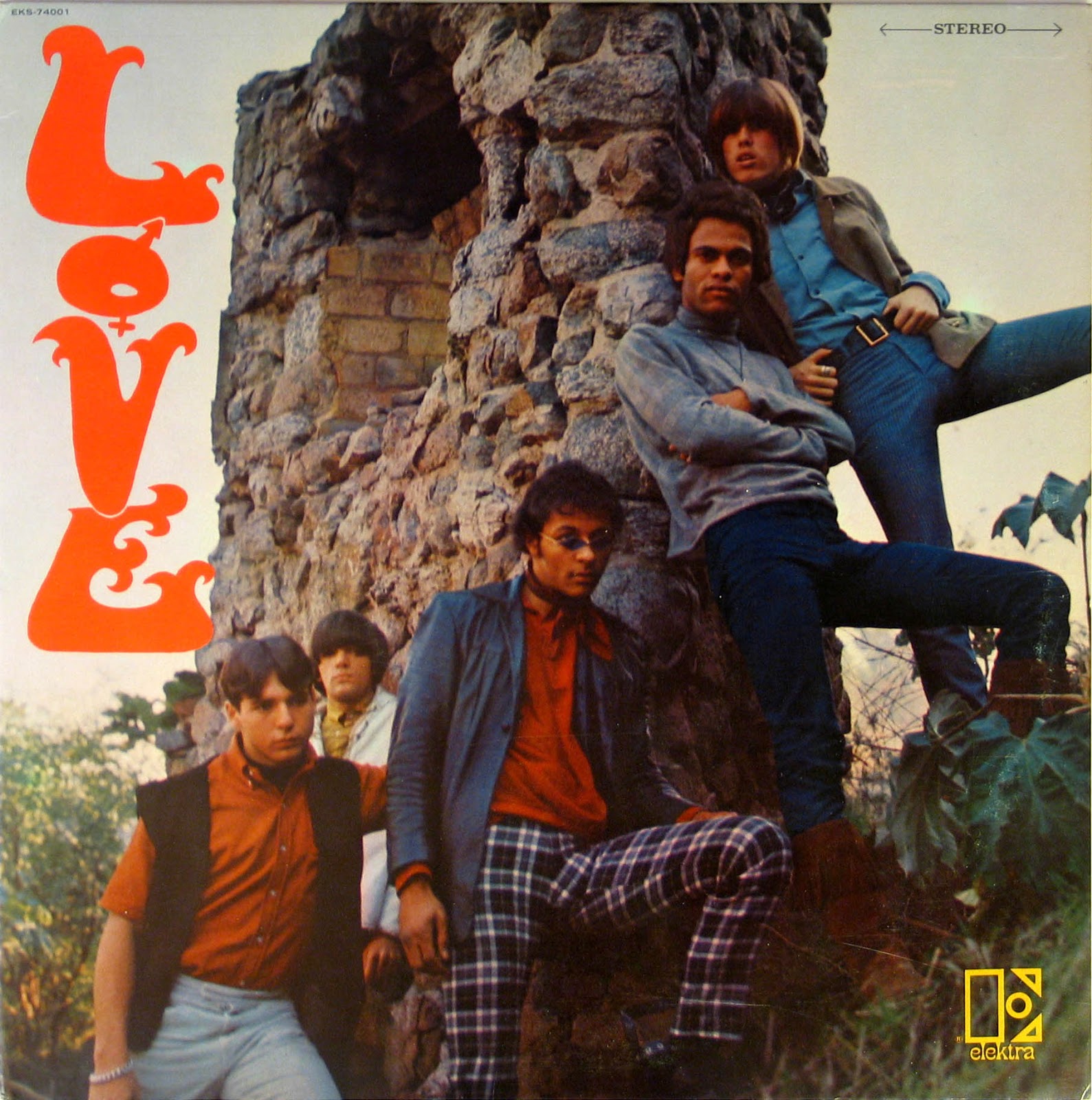
It goes without saying, our first album was lightyears away from the refined, well-produced meticulously recorded albums we would later create.
You all lived together in a sixty-room “Castle” where you played and wrote music daily, can you take us back and share what a typical day looked like back then in the “Castle?” Did you often get visits from other musicians too?
The “Castle” was [The] party spot for musicians. Jim Morrison, The Jefferson Airplane, Jimi Hendrix, David Crosby, Tim Harden, Dennis Hopper, and many, many others often dropped by. When members of Love weren’t playing host to all the folks who came to Castle. We were jamming and working on songs. We used a large room that had once been the library as our rehearsal space where our amps and guitars were always set up, and ready anytime we felt the urge to play.
“Arthur Lee had an amazing genius for using other musicians as tools, not in the negative sense”
You were truly a group in the right sense of the word. Arthur Lee wrote the words and melody and each member of the group wrote their own parts. Would you like to elaborate on the writing process for Love?
Arthur Lee had an amazing genius for using other musicians as tools, not in the negative sense. But very much the way, a gifted craftsman would use his tools as an extension of himself. We were the means by which he was able to create music that he was incapable of playing himself. That’s not to say that he couldn’t have been a phenomenal guitar player if he had put in the requisite time. He was just never really interested in learning the instrument. Arthur would basically sing us the melodies, and leave the rest to us. Once we played something he liked, that became a part of “his” song, and he would recall it, even if we’d forgotten it. He’d say “Bryan [Bryan MacLean, bassist], remember that thing you played da-da-da-da-da, and Echols played, de-de-de-de-de? [It was fascinating how he was able to keep these snippets of music in his head, and often weeks later incorporate them into a song.] And of course, each of us was expected to remember something we’d played, days, or weeks before. It kept us on our toes. We would keep experimenting with different chords and rhythms, et cetera until we had a song. Love songs were most definitely a group effort.
God, if Arthur showed me 10% of a song, I’d be amazed. I can remember for the song ‘August’ he sang the melody part to me and that was it. No other advice was given for that entire song. I was left to conceive the riff based on what he sang to me and everything else that was on that song. I put that riff where he wanted it and probably started it the way he wanted it but after that, it was all me. The rest of it? Who knows. It was more or less a free-for-all. For ‘Robert Montgomery’ I had worked out this whole long intricate guitar solo getting higher and higher to the top of the scale with all these arpeggios and Arthur stopped me and said, ‘Fucking great, man. Now add “da do da do da do dah”’ like The Beatles’ trumpet part. So I said, “Okay! Great” and added that to finish the solo. That was his input on that. Other than these two songs there was no input whatsoever. None! – Jay Donnellan.
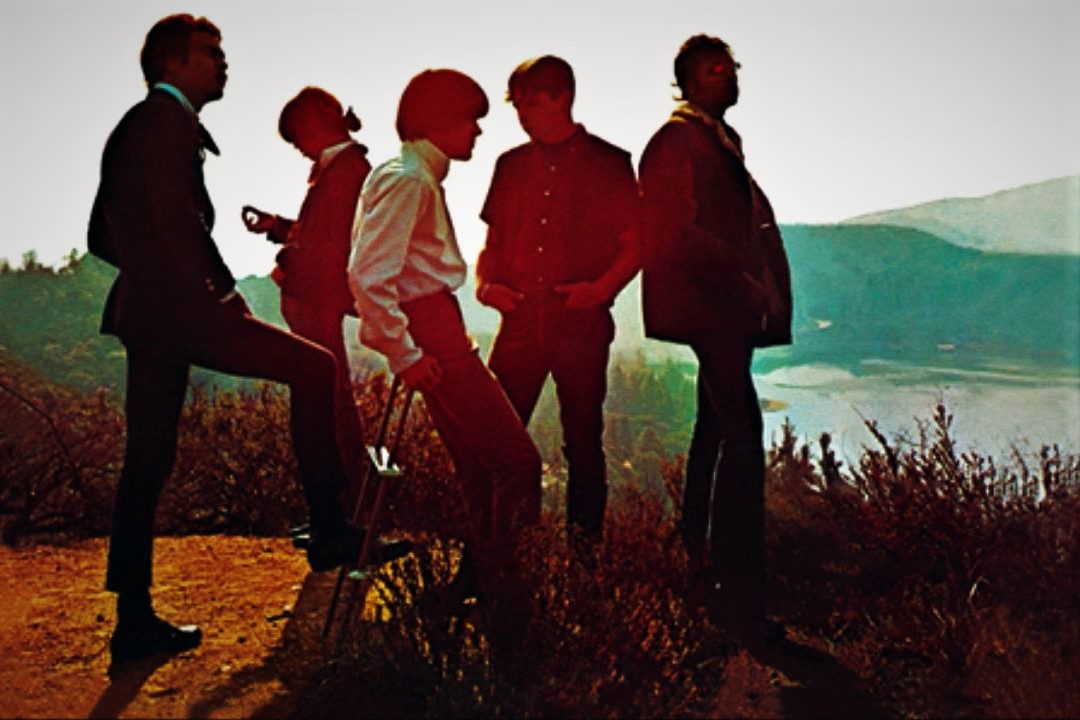
How do you like the newly remastered sound in comparison to the original version?
In my not-so-humble opinion, the remastered versions sound much better than the originals.
Were you inspired by psychoactive substances like LSD at the time?
We used copious amounts of drugs back in the day, mainly, marijuana and hashish. We did, however, take a number of LSD trips. I don’t know if it inspired us, but it definitely OPENED-OUR-MINDS!
“Jim Morrison, the larger-than-life rock Icon, suffered from a serious case of coulrophobia”
You briefly describe the circumstances around the Doors in our previous interview. You were close friends with Jim Morrison, do you have any stories of him you wish to share with our readers?
I scored some free passes to the circus so I invited Jim Morrison and Bob Lee of The Leaves to join me. So the three of us made the trek to the LA Sports Arena to see The Greatest Show on Earth…Barnum & Bailey Circus. As we made our way to our seats we were subject to catcalls and insults from the crowd, “are you boys or girls?” “Why don’t you go to Vietnam and fight for your country?” With our long hair and hippy attire, this reaction happened frequently when we left Hollywood. An usher noticing all the commotion showed us to our seats in the reserved section which seemed to fire up the crowd even more and the heckling grew even louder. After a few minutes, the catcalls subsided, and we settled in to watch the show. Everything was cool, we were enjoying ourselves and having fun. Until the clowns came out. Jim [Morrison] began screaming and cursing the clowns and behaving like a madman. We couldn’t get him to stop. I was so embarrassed. I wanted to be anywhere other than where I was. The usher (who had been so helpful, along with several security officers came to the rescue. They unceremoniously escorted us off the premises. Unbeknownst to me at the time. Jim Morrison, the larger-than-life rock Icon, suffered from a serious case of coulrophobia. The pathological fear of clowns.
I’ve been recently obsessing over Henry Vestine’s guitar playing. He was part of the very early incarnation of the group, right? Did you stay in touch during the late 60s when he was part of Canned Heat?
Henry Vestine was a longtime friend and a member of several groups Arthur Lee and I formed over the years. We played local clubs, wedding receptions, bar mitzvahs, house parties, et cetera. However, we mainly played Fraternity parties. We were a fixture at colleges from Sacramento to San Diego. In early 1968 (after all the turmoil that surrounded the recording of ‘Forever Changes’) the group was seriously considering going our separate ways. Henry [Vestine] and I talked of starting a blues group that would have included drum phenom Don Conka, who had recently emerged (drug-free) from rehab. Unfortunately, or fortunately (depending on your perspective) that was right at the point when Canned Heat was beginning to break out. So we never formed our blues supergroup, it would have been a blast.
The most impressive part of this box set is definitely a 62-page booklet featuring track-by-track annotation by you and in-depth liner notes from Grammy Award-nominated writer Andrew Sandoval. How long did you work on it?
I have a great deal of respect for Andrew Sandoval. We worked on the project separately over several weeks. I’ve collaborated with him on a number of things over the years and he is super knowledgeable about sixties music and a consummate professional.
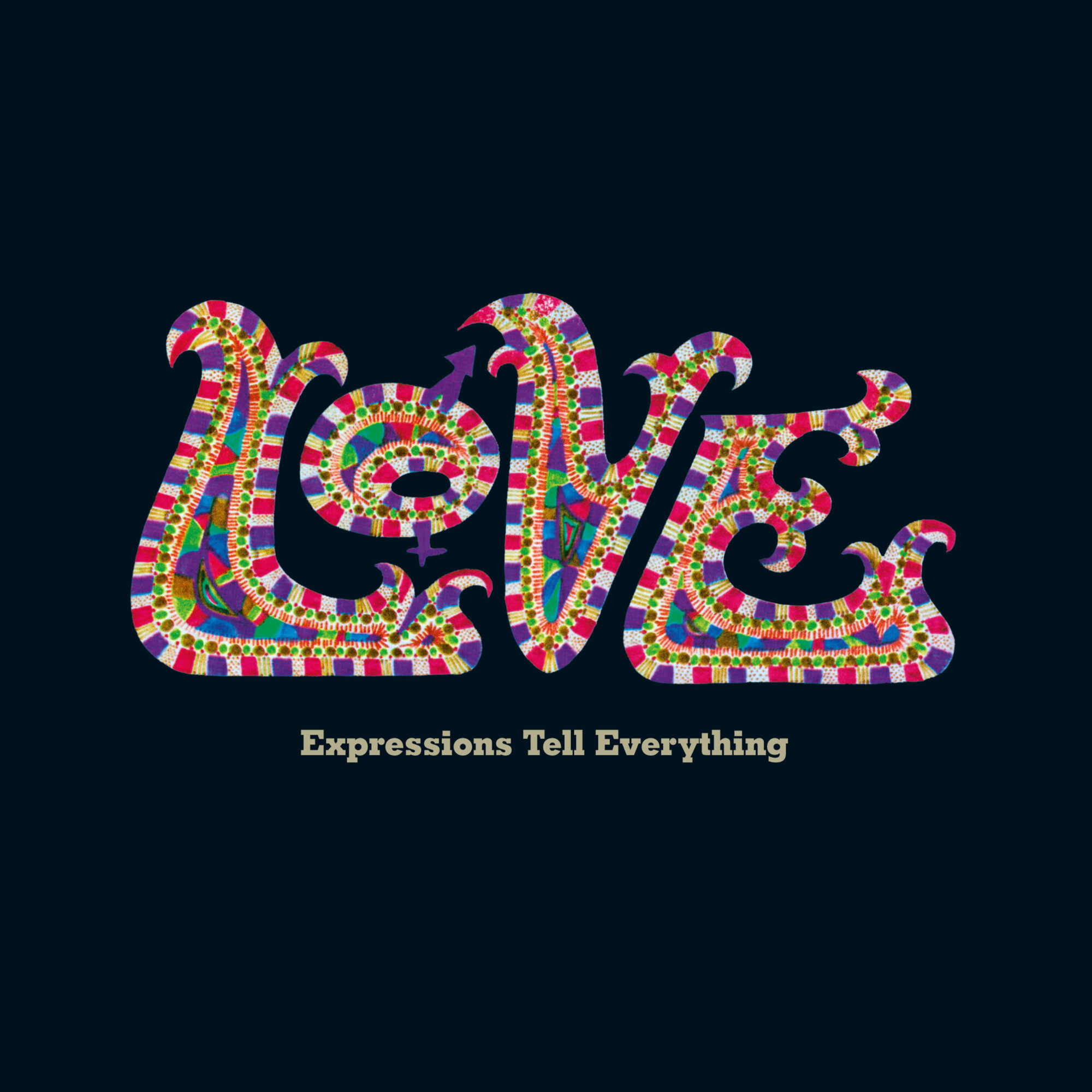
Was it difficult to remember all the details from the past?
Not at all, I was blessed with a very good memory. I also have my lady, Georgiana Steele-Waller, (whom I’ve known since I was a teenager) to help fill in pertinent details I may have overlooked.
Did it bring any forgotten memories?
Yes, traveling down memory lane invariably transports me to another place and time. I’ve had a fascinating life, so I enjoy traveling back in time.
“You haven’t lived until you’ve flown over the Rockies, through pitch-black-darkness, in a tiny six-seater plane; with your pilot loudly singing one minute and crying the next.”
What would be the craziest story that happened to the band?
You haven’t lived until you’ve flown over the Rockies, through pitch-black-darkness, in a tiny six-seater plane; with your pilot loudly singing one minute and crying the next. Seems he’d gotten “contact high” from all the hashish the group was smoking. He was flying by instrument, and could easily have miscalculated and slammed the plane into the side of a mountain. I get a queasy feeling in the pit of my stomach every time I think about that night. When you consider all the small planes with musicians onboard, that have gone down under mysterious circumstances…our truly frightening experience, just might provide a clue!
What are some of the most important players that influenced your own style and what in particular did they employ in their playing that you liked? Give us some insights on developing your guitar technique.
Adolph Jacobs, the guitarist in The Coasters, was an early influence on me in a number of ways. Adolph was one of my first teachers. He would often talk about the importance of making the singer look good. When the singer shines, the whole group shines. If the singer sucks, the group sucks. No matter how great the guitar player is. And you never, ever upstage the singer, it’s about him or her, not you. I’ve always taken his advice to heart. Johnny “Guitar” Watson was a phenomenal player whom I learned a lot from. I’m also a devotee of Charlie Christian, T-Bone Walker, Albert Collins, Luther Allison, Wes Montgomery, Kenny Burrell, Barney Kessel, Django Reinhardt, Gabor Szabo as well as many others. I’m a music lover as well as a student of the guitar. Along with blues and rock, I enjoy playing jazz and acoustical, Spanish-style guitar. I try to reflect that in my playing. I enjoy stepping out of my comfort zone. Once you stop begin resting on your laurels, and stop trying to learn, you stop growing as a musician.
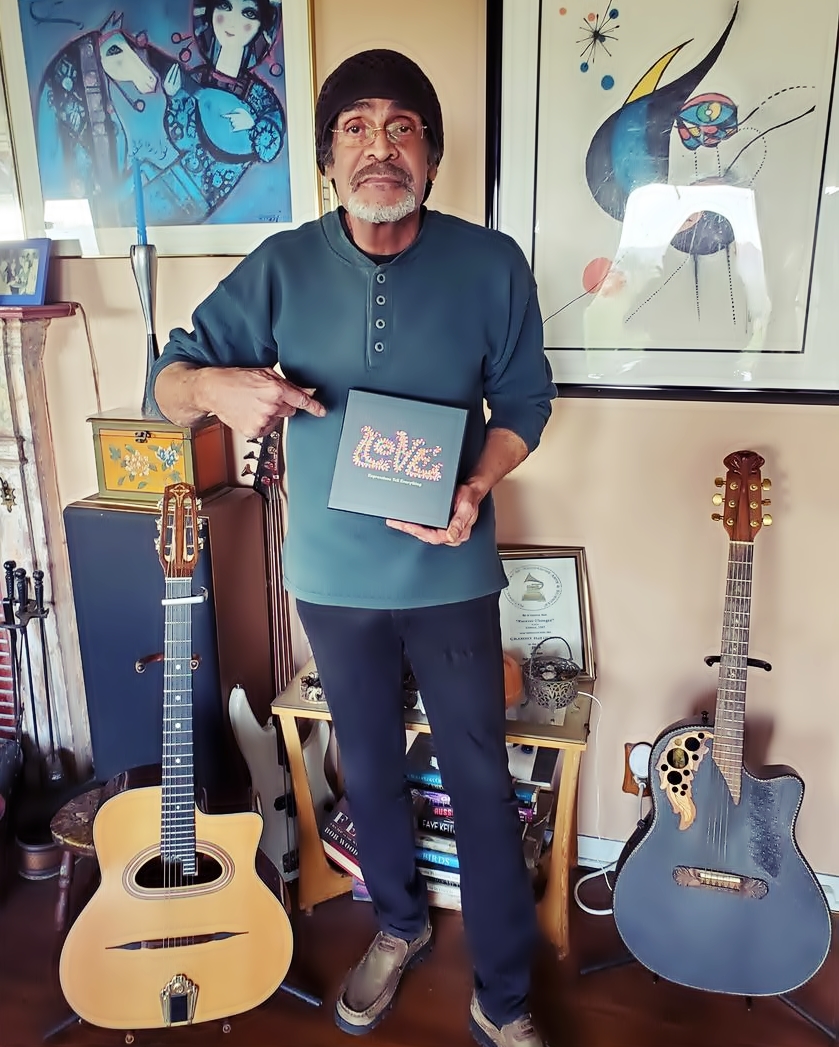
What else currently occupies your life?
Along with writing, recording, and spending time with my lady, as well as longtime friends. I have a blues band featuring Lucky Otis, the son of the phenomenal guitarist Shuggie Otis and grandson of Johnny Otis. However, touring and playing the phenomenal music of Love to audiences both here and abroad, is the joy of my life. Along with appearing regularly at local venues, we’re currently preparing to tour the UK this Summer.”
Headline photo: Love promotional photo | © Guy Webster Rock Photography Museum
New Land Records Official Website / Facebook / Instagram / YouTube
Love | Interview | Johnny Echols

